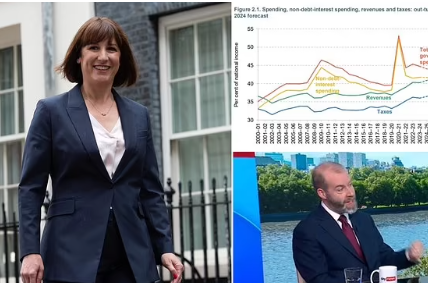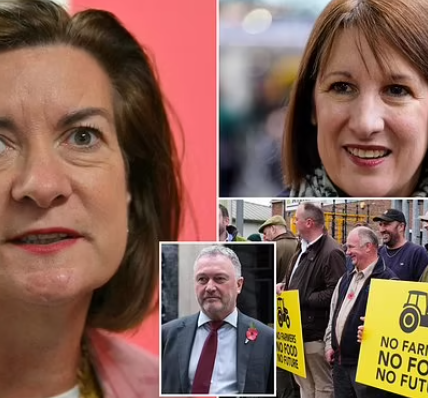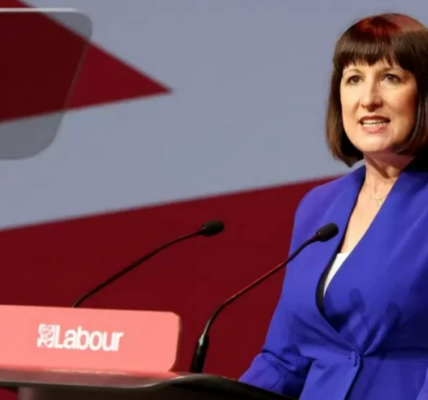Nigel Farage and Reform UK would win 67 seats from Labour at the next General Election, new poll claims_Nhy
Reform UK would take 67 seats from Labour at the next general election, according to a new poll.
Labour would lose its majority as well as 200 seats which were won in July, losing 87 seats to the Conservatives, 67 to Reform UK and 26 to the SNP, The Times reported.
The Red Wall gains made by Labour earlier this year would be almost entirely reversed.
Think tank More In Common produced the poll with survey data of more than 11,000 people between October 31 and December 16.
If the polling results were to be reflected across the country, none of the parties would be likely to have enough votes to secure a majority.
Labour would remain the largest party with 228 seats, just six more than the Conservatives on 222, Reform would surge to 72 seats, with the Lib Dems on 58 and the SNP on 37.
The results would mean five parties have over 30 seats, meaning coalition deals would need to be made to secure a government.
Seven cabinet ministers would lose their seats, six of them to Reform, with Health Secretary Wes Streeting losing Ilford North to an independent candidate, according to the analysis.

Nigel Farage and Reform could be set for a huge surge in votes at the next General Election

Keir Starmer and the Labour party would be likely to lose their majority if an election took place today

Health Secretary Wes Streeting could be at risk of losing his seat at the next general election

Deputy Prime Minister Angela Rayner is one of a whole host of Labour cabinet memebrs who could see their seats lost to Reform
Deputy Prime Minister Angela Rayner, Home Secretary Yvette Cooper and fellow cabinet ministers John Healey, Ed Miliband, Bridget Phillipson and Jonathan Reynolds would also be set to lose their seats to Nigel Farage’s party.
The poll shows how political allegience has begun to fragment since the last election, with more people chosing against the two main parties.
Around 300 seats would either be won by a narrow magin of less than five per cent or be too close to call.
In two of every five seats in the UK, the winning party would recieve less than a third of the vote share.
Across the country there would be a series of exceptionally close three-way races between the Conservatives, Labour and Reform UK (and the SNP in some races in Scotland).
Reform UK

Farage is hoping to use local elections in May as a platform to overtake the Tories at the next general election
Reform look set to dominate in South Yorkshire and Tyneside, as well as picking up seats in Nottinghamshire and their first ever seats in Wales.
Nigel Farage’s party would also come second in 206 seats across the UK.
Farage is hoping to use local elections in May as a platform to overtake the Tories at the next general election.
Seats in Essex and Kent will also be targeted, along with those in Lincolnshire, Nottinghamshire and Derbyshire. Control of Thurrock council in Essex is also one of its aims if elections take place there.
Labour
Labour’s victory was described as a ‘loveless landslide’, which has led to a hostile honeymoon as their popularity continues to plummet.
Within less than a year in power, Starmer has overseen a freebie scandal, revolt from farmers and had to sack his cheif of staff, Sue Gray, who was earning more than he did as Prime Minister.
The party also faced a backlash over the decision to scrap the winter fuel payment for millions of pensioners and the decision by Rachel Reeves, to increase employers’ national insurance contributions.
Labour is on track for its worst end to the year in opinion polls since the Second World War, according to analysis by Sky News.
Starmer’s party is just one percentage point behind its previous end-of-year low in 2016 under Corbyn’s tenure.
The only other years to rival its current low of 26.6 were 1981, when the new SDP-Liberal Alliance upended politics, and in 2009, when the party was reeling from the recession and an expenses scandal after more than a decade in power.
Conervatives

Despite gains predicted fro the Conservatives, Kemi Badenoch is predicted to be well short of being able to acheieve a majority
The Conservatives, meanwhile, are struggling to break out beyond their heartlands and are losing ground to Reform.
Among their 102 seats which they are expected to gain are Penny Mordaunt’s Portsmouth North seat, Liz Truss’s seat of South West Norfolk, Sir Jacob Rees-Mogg’s North East Somerset seat, and Grant Shapps’s seat of Welwyn Hatfield.
However, this would still put them a long way off the majoprity needed of 326
Despite only becoming leader in November, Kemi Badenoch has worse personal approval ratings than those recorded by Rishi Sunak and Boris Johnson when they beacme Tory leader and prime minister, according to the latest Opinium poll for The Observer.
The only former party leader of the past five years that she beats in terms of her starting popularity is Liz Truss.
Scottish National Party
The SNP would be set for a recovery in Scotland after their wipeout in July.
The poll suggests they would gain back 28 seats, reversing many of Labour’s gains but still below their 2019 total of 48 seats.
The party is hoping to stabilise under the leadership of John Swinney after a chaotic year which led to the departure of Humsa Yousaf
Liberal Democrats
The Liberal Democrats would lose 14 seats but still comfortably hold a large majority of those won from the Conservatives in July.
Polling also suggests all current Independent MPs would be likely to retain their seats, including former Labour leader Jeremy Corbyn.
Luke Tryl, Executive Director of More in Common UK, said: ‘With potentially four and a half years to go, this model is not a prediction of what would happen at the next General Election.
‘There is no doubt that many voters have found the start of the Starmer Government disappointing and Labour’s estimated vote share would drop significantly were there to be an election tomorrow.
‘While the new Government is still in its infancy it is clear that decisions such as means testing the winter fuel allowance and other budget measures have landed badly.




